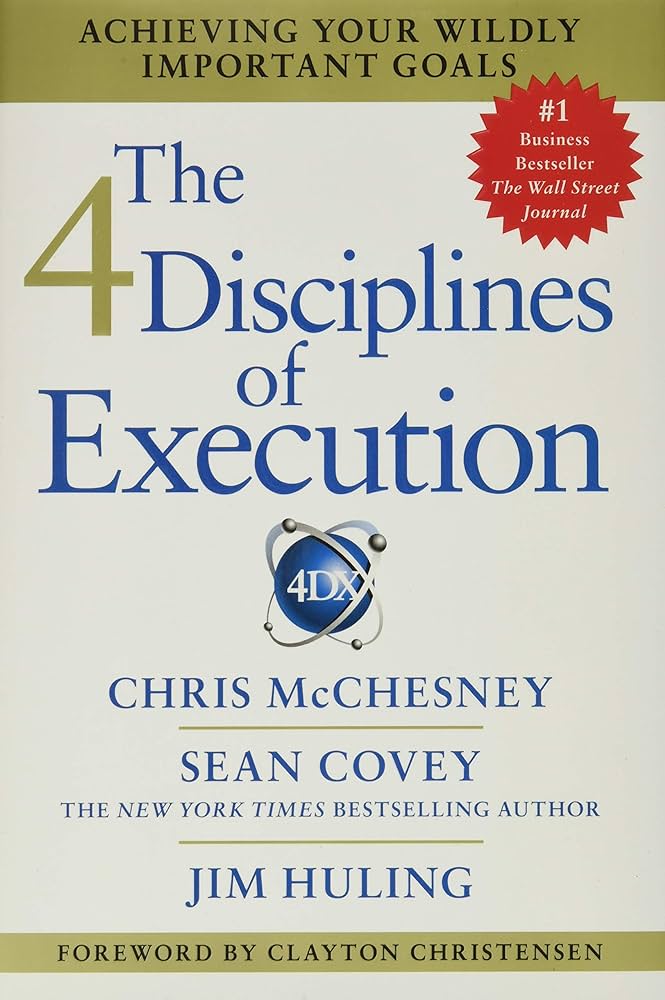
1 Line Summary
The 4 Disciplines of Execution is a book that teaches leaders and teams how to achieve their most important goals by focusing on the few things that matter most and taking disciplined action to make them happen.
What Will You Learn
Here are benefits of reading “The 4 Disciplines of Execution”. You’ll learn how to:
- set clear goals and priorities.
- focus your energy on the things that matter most.
- measure your progress and track your results.
- create a culture of accountability and teamwork.
Best Quotations from the Book
- “The enemy of execution is not lack of time, it’s lack of focus.”
- “The scoreboard tells the story. The only way to achieve breakthrough results is to have a compelling scoreboard.“
- “Accountability is the glue that binds the other disciplines together.”
- “The only way to sustain change is to make it irresistible.”
- “The only way to change your results is to change your behavior.”
- “The only way to make extraordinary results ordinary is to make them repeatable.”
Book Summary
Focus on the Wildly Important
The first discipline emphasizes the importance of identifying and prioritizing the most critical objectives.
- Strategic Clarity: For executives, clarity on what truly matters is paramount. Identifying the “Wildly Important” goals ensures that you and your team are aligned with the organization’s strategic priorities.
- Priority Setting: Effective leaders understand that not all goals are created equal. Focus on a limited number of critical objectives, allocating resources and attention where they can have the most significant impact.
- Strategic Alignment: Communicate these crucial objectives clearly throughout the organization. Ensure that every team member understands their role in achieving them, reinforcing alignment with the overarching mission.
Act on the Lead Measures
The second discipline introduces the concept of “lead measures,” which are the specific actions that drive progress toward the Wildly Important goals.
- Data-Driven Decision-Making: Executives must rely on actionable data to make informed decisions. Identifying and tracking lead measures enables you to monitor progress and make necessary adjustments in real-time.
- Efficient Resource Allocation: Understanding the lead measures allows you to allocate resources effectively. Invest time, talent, and resources in areas that have the most significant impact on achieving your critical objectives.
- Accountability and Ownership: Assign responsibility for lead measures to specific team members or departments. This promotes accountability and ensures that progress is actively monitored.
Keep a Compelling Scoreboard
The third discipline emphasizes the importance of creating a visual representation of progress through a scoreboard.
- Transparency: Transparency is vital in leadership. A compelling scoreboard ensures that everyone within the organization can see progress toward the Wildly Important goals, fostering a sense of accountability and motivation.
- Motivation: A visible scoreboard creates healthy competition and motivates teams to excel. It instills a sense of ownership and pride in achieving milestones.
- Real-time Feedback: The scoreboard provides real-time feedback, enabling executives to identify bottlenecks, inefficiencies, or deviations from the plan promptly. This allows for agile adjustments when necessary.
Create a Cadence of Accountability
The fourth discipline establishes regular checkpoints to ensure that progress is monitored and adjustments are made.
- Regular Review Meetings: As an executive, establish a cadence of accountability through regular review meetings. These meetings provide an opportunity to assess progress, discuss challenges, and strategize solutions.
- Ownership and Responsibility: Encourage team members to take ownership of their commitments. These review meetings ensure that each team member is accountable for their role in achieving the Wildly Important goals.
- Adaptability: The cadence of accountability allows for flexibility. If strategies aren’t working as expected, you can pivot and adjust tactics in a timely manner, preventing setbacks.
Maintain a Culture of Engagement
This underscores the importance of fostering a culture of engagement throughout the execution process.
- Employee Buy-in: Engaged employees are more likely to commit to the Wildly Important goals and take ownership of their responsibilities. Executives play a critical role in creating a culture where employees feel valued and motivated.
- Continuous Communication: Effective leadership involves ongoing communication. Keep the lines of communication open, listen to feedback, and address concerns promptly to maintain engagement.
- Recognition and Celebrations: Acknowledge and celebrate achievements along the way. Recognizing milestones and successes fosters a positive, engaged work environment.
Empower Teams with Autonomy
This emphasizes the importance of empowering teams to make decisions and take ownership of their roles in goal execution.
- Delegation: Executives should delegate authority and decision-making responsibility to teams and individuals. This empowers them to act swiftly and make necessary adjustments without excessive oversight.
- Trust and Accountability: Trust your teams to execute the plan effectively. Trust breeds accountability, and when employees feel trusted, they are more likely to take ownership of their responsibilities.
- Leadership Support: Provide guidance and support while allowing teams the autonomy to execute the plan in their unique ways. This balance fosters a culture of innovation and accountability.
Sustain Focus for Long-term Success
The ability to sustain focus on the Wildly Important goals over the long term is crucial for achieving lasting success.
- Resilience: Executives must exhibit resilience in the face of challenges and setbacks. Maintaining focus on the critical objectives, even when faced with obstacles, is essential.
- Continuous Improvement: The pursuit of Wildly Important goals is an ongoing process. Encourage a culture of continuous improvement, where teams regularly evaluate and refine their strategies for long-term success.
- Visionary Leadership: As an executive, you play a pivotal role in sustaining focus. Maintain a visionary outlook, consistently communicating the importance of the Wildly Important goals and their alignment with the organization’s mission.
Are you ready to achieve your most important goals? Are you ready to stop spinning your wheels and start making real progress? Then read “The 4 Disciplines of Execution” by Chris McChesney, Sean Covey, and Jim Huling today!
Click to read “13 Things Mentally Strong People Don’t Do“, “Code of the Extraordinary Mind”, “Solving the Procrastination Puzzle” and “Emotional Intelligence and its Role in Self Awareness“


Pingback: “The Art of Racing in the Rain” by Garth Stein
Pingback: "The Art of Possibility": Book Summary
Pingback: “Code of the Extraordinary Mind”: Book Summary -
Pingback: “Extreme Ownership” by Jocko Willink: Book Summary -
Pingback: “The One Thing” by Gary Keller and Jay Papasan: Book Summary
Pingback: “Breaking The Habit Of Being Yourself”: Book Summary »
Pingback: “Eat that Frog” by Brian Tracy: Book Summary
Pingback: “Extreme Ownership” by Jocko Willink: Book Summary »